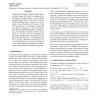Free Online Productivity Tools
i2Speak
i2Symbol
i2OCR
iTex2Img
iWeb2Print
iWeb2Shot
i2Type
iPdf2Split
iPdf2Merge
i2Bopomofo
i2Arabic
i2Style
i2Image
i2PDF
iLatex2Rtf
Sci2ools
117
click to vote
ICML
2005
IEEE
2005
IEEE
Active learning for Hidden Markov Models: objective functions and algorithms
Hidden Markov Models (HMMs) model sequential data in many fields such as text/speech processing and biosignal analysis. Active learning algorithms learn faster and/or better by closing the data-gathering loop, i.e., they choose the examples most informative with respect to their learning objectives. We introduce a framework and objective functions for active learning in three fundamental HMM problems: model learning, state estimation, and path estimation. In addition, we describe a new set of algorithms for efficiently finding optimal greedy queries using these objective functions. The algorithms are fast, i.e., linear in the number of time steps to select the optimal query and we present empirical results showing that these algorithms can significantly reduce the need for labelled training data.
Active Learning Algorithms | ICML 2005 | Machine Learning | Objective Functions | Optimal Greedy Queries |
Related Content
| Added | 17 Nov 2009 |
| Updated | 17 Nov 2009 |
| Type | Conference |
| Year | 2005 |
| Where | ICML |
| Authors | Brigham Anderson, Andrew Moore |
Comments (0)

